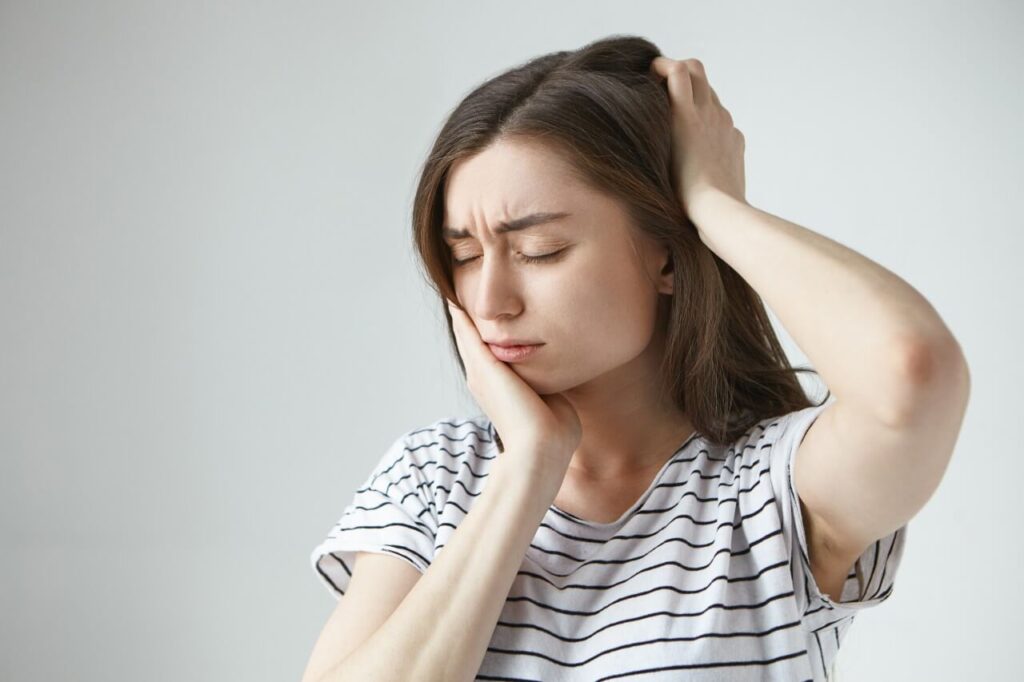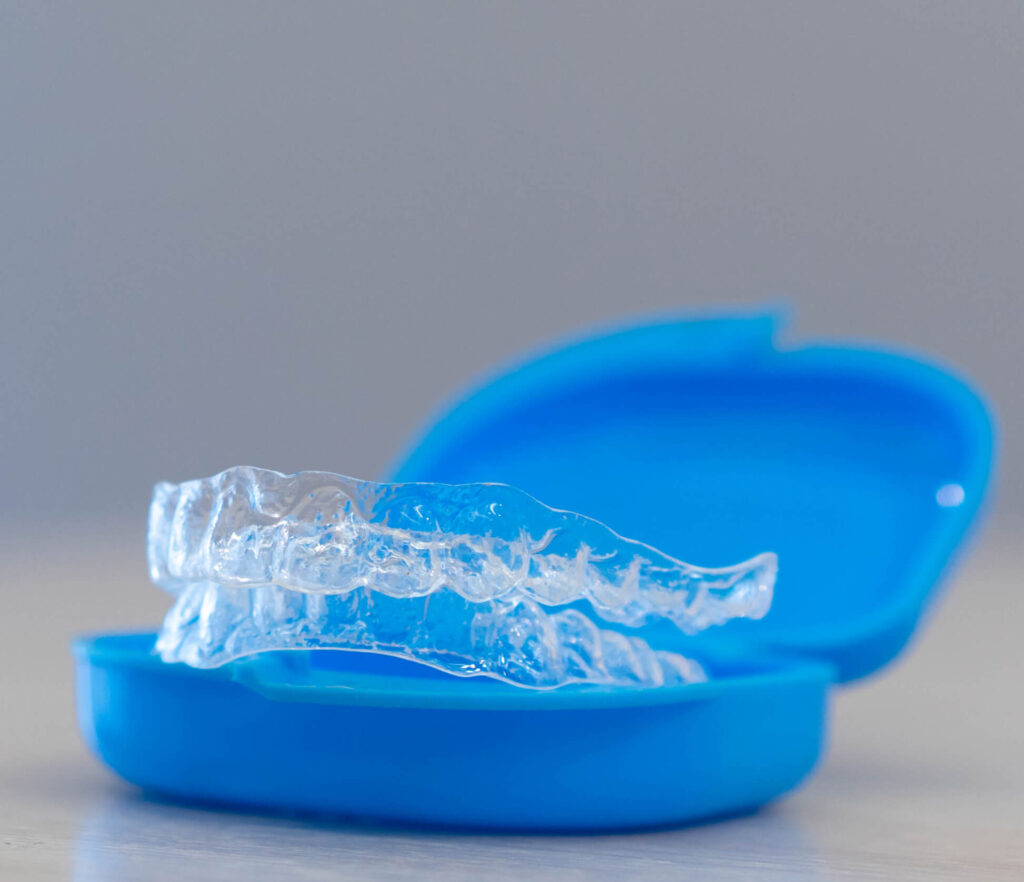For millions of people recovering from the COVID-19 pandemic, one question that might be on their mind is – what are the long-term side effects? Although we don’t have all the data yet, one common symptom occurring for recovered patients is jaw pain. Although jaw pain or temporomandibular joint disorder (TMJD) is not a direct symptom of the COVID-19 virus, it is a symptom of the pandemic and an unfortunate side effect following the recovery.

For some patients who have recovered from COVID-19, jaw pain or joint pain in their jaw may result from excessive mouth breathing due to having a more challenging time breathing. With the mouth open more and longer, it forces the individual to use muscles in their neck to help them breathe. This action causes the neck muscles to pull on the jaw, which becomes strained and can cause jaw and neck pain.
Stress is another factor that causes jaw pain, whether it is pre-COVID or post-COVID. However, with all the uncertainty due to COVID, it has caused individuals to reach higher levels of stress, and anxiety. For some, stress causes individuals to clench their teeth while they sleep. The clenching motion places a significant amount of pressure on the TMJ joint resulting in pain in the jaws. Here are some other symptoms of teeth clenching when the jaw joint is overworked or agitated.
Stress not only causes people to clench while they sleep, but it can also cause people to grind their teeth. According to the American Dental Association, since the start of the COVID pandemic, dentists have seen almost a 60% rise in patients complaining of bruxism or nighttime teeth grinding. In addition, they have noted TMJ symptoms among more than half of their patients. But how do you know if you are grinding your teeth in your sleep? Here are some signs of teeth grinding:
To minimize jaw clenching and grinding your teeth, reduce your stress level by following some of these tips.
If you are experiencing any jaw pain, whether or not you have had COVID, our dentist in Fairview is here to help. During your exam, your dentist will begin by evaluating your jaw joints and asking about your symptoms to see what kind of treatment is recommended. If the culprit of jaw pain is due to bruxism, your dentist will generally recommend using a night guard. By using a night guard, it will help protect your teeth and alleviate the strain on the TMJ while you sleep.
If you have any questions about your dental health, bruxism, TMJ disorder, or oral appliance therapy, please call our office at 972-468-1440 today to schedule your consultation with Dr. Feng. Our dental office is located in Fairview, Texas, and our patients visit us from across the surrounding areas, including Allen, Plano, McKinney, and Lucas.

We firmly believe that the internet should be available and accessible to anyone, and are committed to providing a website that is accessible to the widest possible audience, regardless of circumstance and ability.
To fulfill this, we aim to adhere as strictly as possible to the World Wide Web Consortium’s (W3C) Web Content Accessibility Guidelines 2.1 (WCAG 2.1) at the AA level. These guidelines explain how to make web content accessible to people with a wide array of disabilities. Complying with those guidelines helps us ensure that the website is accessible to all people: blind people, people with motor impairments, visual impairment, cognitive disabilities, and more.
This website utilizes various technologies that are meant to make it as accessible as possible at all times. We utilize an accessibility interface that allows persons with specific disabilities to adjust the website’s UI (user interface) and design it to their personal needs.
Additionally, the website utilizes an AI-based application that runs in the background and optimizes its accessibility level constantly. This application remediates the website’s HTML, adapts Its functionality and behavior for screen-readers used by the blind users, and for keyboard functions used by individuals with motor impairments.
If you’ve found a malfunction or have ideas for improvement, we’ll be happy to hear from you. You can reach out to the website’s operators by using the following email
Our website implements the ARIA attributes (Accessible Rich Internet Applications) technique, alongside various different behavioral changes, to ensure blind users visiting with screen-readers are able to read, comprehend, and enjoy the website’s functions. As soon as a user with a screen-reader enters your site, they immediately receive a prompt to enter the Screen-Reader Profile so they can browse and operate your site effectively. Here’s how our website covers some of the most important screen-reader requirements, alongside console screenshots of code examples:
Screen-reader optimization: we run a background process that learns the website’s components from top to bottom, to ensure ongoing compliance even when updating the website. In this process, we provide screen-readers with meaningful data using the ARIA set of attributes. For example, we provide accurate form labels; descriptions for actionable icons (social media icons, search icons, cart icons, etc.); validation guidance for form inputs; element roles such as buttons, menus, modal dialogues (popups), and others. Additionally, the background process scans all of the website’s images and provides an accurate and meaningful image-object-recognition-based description as an ALT (alternate text) tag for images that are not described. It will also extract texts that are embedded within the image, using an OCR (optical character recognition) technology. To turn on screen-reader adjustments at any time, users need only to press the Alt+1 keyboard combination. Screen-reader users also get automatic announcements to turn the Screen-reader mode on as soon as they enter the website.
These adjustments are compatible with all popular screen readers, including JAWS and NVDA.
Keyboard navigation optimization: The background process also adjusts the website’s HTML, and adds various behaviors using JavaScript code to make the website operable by the keyboard. This includes the ability to navigate the website using the Tab and Shift+Tab keys, operate dropdowns with the arrow keys, close them with Esc, trigger buttons and links using the Enter key, navigate between radio and checkbox elements using the arrow keys, and fill them in with the Spacebar or Enter key.Additionally, keyboard users will find quick-navigation and content-skip menus, available at any time by clicking Alt+1, or as the first elements of the site while navigating with the keyboard. The background process also handles triggered popups by moving the keyboard focus towards them as soon as they appear, and not allow the focus drift outside of it.
Users can also use shortcuts such as “M” (menus), “H” (headings), “F” (forms), “B” (buttons), and “G” (graphics) to jump to specific elements.
We aim to support the widest array of browsers and assistive technologies as possible, so our users can choose the best fitting tools for them, with as few limitations as possible. Therefore, we have worked very hard to be able to support all major systems that comprise over 95% of the user market share including Google Chrome, Mozilla Firefox, Apple Safari, Opera and Microsoft Edge, JAWS and NVDA (screen readers), both for Windows and for MAC users.
Despite our very best efforts to allow anybody to adjust the website to their needs, there may still be pages or sections that are not fully accessible, are in the process of becoming accessible, or are lacking an adequate technological solution to make them accessible. Still, we are continually improving our accessibility, adding, updating and improving its options and features, and developing and adopting new technologies. All this is meant to reach the optimal level of accessibility, following technological advancements. For any assistance, please reach out to